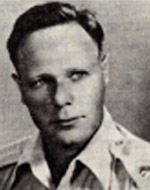Tzafriri, Zivi
Son of Jacob and Batya. He was born on 8 July 1927 in Ein Harod, and at a young age he was influenced by the events of 1929 until he said that he would defeat all the Arabs. Later, when he was a boy and a student, when he heard from his mother stories about pogroms against Jews in a distant and alien land, he would say: “Here in our land there are heroes, always mighty – all day and night, and you can not beat us and make us pogroms” Tells his mother about the life of a boy in Israel at the time, when our neighbors were two on each side, and there was also a hint of the thoughts and plans of these boys. He studied at the “Ohel Shem” Gymnasium in Ramat Gan and later moved to the agricultural school near Givat Hashlosha. When he was in the school, he completed a course for the youth training and was able to train himself as an ideal guide – giving a command with a strong hand and with it gently, a commander in a row and a friend from outside. Einat’s farm and became a tractor operator – and his devotion was endless – at the beginning of his arrival in the kibbutz he also played the violin, but he decided that he wanted to resemble the rest of the kibbutzniks because they did not play, It was time to join the Palmach, but he was not eager to meet him, because he believed that every member of the farm should be close to his weight for a year or two. But the needs of the Yishuv and his security decided, and he joined the ranks of the Palmach, during which he also had vacation days and then came home and invested himself in his favorite agriculture. He took part in the struggle and the uprising, the removal of illegal immigrants and the blowing up of police stations, as well as other difficult operations. But at the outbreak of the War of Independence he participated in various campaigns of fighting and retaliation, such as the breakthrough to Tel Litvinsky, the conquest of Salameh, and more. He was then sent as a company commander to Jerusalem, participated in the conquest of Sheikh Jarrah, broke into the Old City, liberated Ramat Rachel, fought in the Latrun area, and at the outskirts of the capital. He was then transferred to the Negev, where he broke through. After the fighting, he moved to the Armored Corps, participated in a tank training course until victory came. Then he went back to his farm – and to Falah; And he did not tell much about his exploits, and even when he told them about them, he did so only modestly and without a desire to stand out. He was gifted with the ability to analyze easily and logically world events – political and military, but when he fell in love with children, he also knew how to be their friend with the affection and friendship he showed them, the satisfaction with their amusement and mischief. He was a social man, but he had precious hours of communion with himself, for his Lev and soul were subject to a life of creation and peace; But in the protection of human life, his freedom and dignity he felt a supreme order, and especially he saw in these the national destiny to which he was given and sanctified. In September 1950 he joined the regular army and reached the rank of lieutenant colonel. On the first line of fire, he was one of the first to break into the enemy’s strongholds, storming the Egyptian outpost in Rafah and less than half an hour later, But he was no longer there, because he fell in the battle of Rafah on 27 March 1957. He was buried in the emergency military cemetery in Bari and on the 18th of Elul 5707 (18.9.1957) was transferred to a rest- Einat Shem “was opened at the Ohel Shem School, which is a study hall for Gadanim in particular and for students in general. An annual stoppage was established by his father at the Mikveh Israel agricultural school. At the end of the year (in March of 1958), Kibbutz Einat published a booklet in memory of two: HaimThe late Atlas (who fell on the outskirts of Nitzana on the 16th of Marcheshvan 5717) and Ziv Zafriri of blessed memory.
